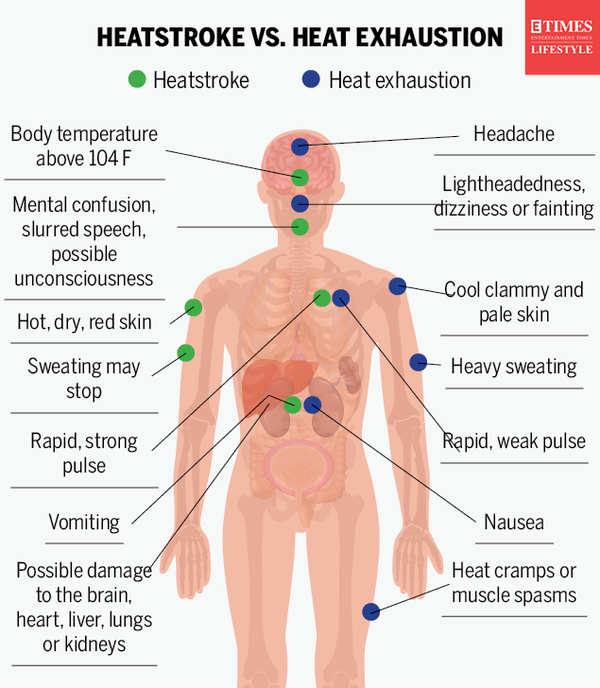Lifestyle
5 different types of heat illnesses and how to recognise them

The hot and humid weather is at its peak right now.
This weather is not only unpleasant but can also get dangerous. If proper precautions are not taken, one can get affected by heat illness, which can even be life-threatening.
Here are some common types of heat illnesses and how you can prevent them
1. Hyperthermia
Hyperthermia is when your body’s temperature is too high due to the soaring temperature outside. This happens when your body is having trouble regulating its temperature, as a result of extreme heat outside.
In hyperthermia the body temperature is generally above 99.5 F. In severe hyperthermia, the temperature goes above 104 F, which can also be life-threatening.
Fever in hyperthermia is not like other fever as it is a result of the heat outside. While other fevers are caused by some illness or infection inside the body.
Symptoms of hyperthermia
Hyperthermia is a group of heat-related illnesses and each one of them has different signs and symptoms. As your body temperature rises you may experience the following symptoms:
2. Heat rash
Heat rashes appear when your sweat gets trapped in your skin due to clogged sweat ducts. These are small in size and mostly reddish-pink in colour. Sometimes these might also look like bug bites or pimples.
The three different types of heat rashes are:
- Crystallina
These look like clear water bubbles and may last for hours or days, These are not usually painful and get fine with time.
- Rubra
These look like reddish pink bumps and are very common. These can last for days to weeks and can cause irritation. No medicine is required as they get fine on their own.
- Profunda
These look like nodules or cysts and are rare. These might last for a few weeks and can be very painful. You would require medicine to treat it. The heat rash is common among babies as their sweat ducts are small and they are unable to regulate the body temperature.
3. Heat cramps
These are involuntary muscle spasms that happen when you exercise in hot and humid weather. This happens because when you work out in extreme heat, your body produces more sweat and you lose more fluids and electrolytes from the body. This increases the chance of muscle cramps. The best way to prevent this is by not exercising in extreme heat.
4. Heat exhaustion
Heat exhaustion can be severe as the symptoms might be felt all over the body. Some common symptoms of heat exhaustion are heavy sweating, rapid/weak pulse, nausea, shortness of breath, lightheadedness and heat cramps.
You can get a heat stroke if you get exposed to heat with all these symptoms.
5. Heatstroke
Heatstroke is the most severe form of heat illness. The two main characteristics of heat stroke are a body temperature rising above 104 F and central nervous system dysfunction. This causes some severe symptoms like confusion, slurred speech and even loss of consciousness in some cases.
Sometimes, it can get difficult to differentiate between heat stroke and heat exhaustion. Here is a chart to help you:

If you know that you or someone else you know has suffered from heatstroke, you need to call the doctor immediately and rush to the hospital. Without immediate medical help, heatstroke can damage vital organs and even lead to death.
How to keep yourself away from getting a heatstroke
- Do not stay in heat
If you are feeling any symptoms of heat illness, make sure to get in some shade or a cool place. Staying in the Sun can make your condition worse.
- Take rest
If you are doing any physical activity, stop it. Take some rest and be in a cool place. If you keep working, your body will not be able to lower down its temperature.
- Hydrate
Replenishing your body with fluids to make up for what you lose through sweating is an important part of the prevention. You can mix some electoral in your drink to improve your hydration.
- Put some cool water on your skin
The quickest way to lower high body temperature caused by hot weather is by taking a cold bath or even spraying some cold water on your skin. You can also use some wet cloth, which will also soothe the irritation caused by rashes if any.
- Wear loose clothes
Tight clothes can trap the heat and make it hard for your body to cool down. Thus, it is best to wear light, loose cotton fabric during the summer season.






